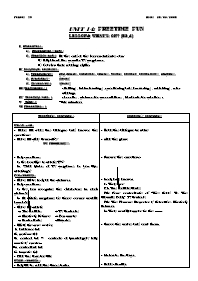Giáo án môn Tiếng Anh Lớp 7 - Period 89, Unit 14: Freetime fun - Lesson 4: What’s on? (B3, 4)

I. Objectives:
1. Educational aim:
2. Teaching aim: By the end of the lesson students can:
talk about the popular TV programs.
develop their reading skills.
II. Language contents:
1. Vocabulary: pop music, audience, artists, bands, contest, contestant, imports.
2. Grammar: (none)
3. Structures: (none)
III Techniques : eliciting , brainstorming ,questioning and answering , matching , role- playing.
IV Teaching aids : cassette , pictures for presentation , handouts for practice .
V Time : 45 minutes.
Bạn đang xem tài liệu "Giáo án môn Tiếng Anh Lớp 7 - Period 89, Unit 14: Freetime fun - Lesson 4: What’s on? (B3, 4)", để tải tài liệu gốc về máy bạn click vào nút DOWNLOAD ở trên
Period: 89 Date: 25/03/2005 UNIT 14: FREETIME FUN LESSON 4: WHAT’S ON? (B3,4) I. Objectives: 1. Educational aim: 2. Teaching aim: By the end of the lesson students can: talk about the popular TV programs. develop their reading skills. II. Language contents: 1. Vocabulary: pop music, audience, artists, bands, contest, contestant, imports. 2. Grammar: (none) 3. Structures: (none) III Techniques : eliciting , brainstorming ,questioning and answering , matching , role- playing. IV Teaching aids : cassette , pictures for presentation , handouts for practice . V Time : 45 minutes. VI Procedures : Teacher’s activities Students’ activities Warm – up - Have SS read the dialogue and answer the questions - Have SS play ‘Networks’ TV PROGRAMS - Ask questions a. Do you like to watch TV? b. What kinds of TV programs do you like watching? Pre-reading - Have SS to look at the pictures. - Ask questions a. Do you recognize the characters in each picture? b. In which programs do these scenes usually appear? - Have SS match + The Moffats + TV Contests + Sherlock Holmes + Pop music + Contestants +Imports - Elicit the new words: 1. audience (n) 2. perform (v) 3. contest (n) ª contests of knowledge/ folk music / sports 4. contestant (n) 5. imports (n) - Play the tape for SS. While reading - Ask SS to read the three texts. - Let them answer the questions. - Call some SS to read the answers - Correct the answers. a. Teenagers like to hear the latest pop music and see the shows of their favorite artists. b. In contest programs, the contestants are students, workers, or family members. c. Imports usually include police and hospital series. d. ( student’s answer ) - Ask SS some more questions a. What are the long form of pop music? b. What are the common kinds of contests? c. How can viewers join in the contests? d. What are the imports? - Have Ss read the texts again and help them understand the content of the texts Post reading - Ask Ss complete the passage in B4/ p146 - Supply some new words: ordinary characters, satellite TV, cable TV, a wide variety of programs - Guide Ss to do. - Call some Ss to give the answers. 1. around 2. watch 3. listen 4. series 5. show 6. like 7. station 8. receive 9. cities 10. possible - Elicit some more new words: receive, possible. - Ask Ss to read the complete passage. - Have SS do survey Questions: a. Do you like watching ? b. What is your most favorite program? - Read the dialogue in pairs - play the game - Answer the questions. - Look and answer. a. They are: P1: The Moffats Band P2: Four contestants of “The Road To The Olympia Peak” TV Contest P3: The Famous Inspector / Detective Sherlock Holmes. b. They usually appear in the - Guess the words and copy them. - Listen to the tape. - Read silently. - Group work - Read the answers aloud. - Correct and Write. - Answer the questions. a. It is “popular music” b. They are contests of knowledge, folk music, games, sports, c. They can join in the contests through telephone or mail. d. Imports are foreign series such as Sherlock Holmes. - Read and Try to understand the texts. - Write new words. - Listen and do as requested. - Read the answers. - Listen and answer. - Read the passage. - Do survey Program Number of students Position News Children’s program Cartoon Pop music Contest Movie The World Today Weather forecast World Discovery Music Gift Cookery Show What is the most popular program? Homework - Reread the texts. - Redo the exercises. - Exercises B4,5/p 91,92. Remark
Tài liệu đính kèm:
 giao_an_mon_tieng_anh_lop_7_period_89_unit_14_freetime_fun_l.doc
giao_an_mon_tieng_anh_lop_7_period_89_unit_14_freetime_fun_l.doc





